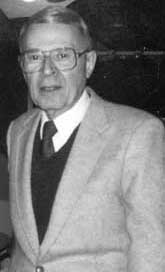 John A. DeNovo, retired professor of history at the University of Wisconsin, died at the age of 83 in Madison, Wisconsin, on January 26, 2000. He suffered a stroke in 1992 and spent his last years in the Attic Angel Health Center in Madison.
John A. DeNovo, retired professor of history at the University of Wisconsin, died at the age of 83 in Madison, Wisconsin, on January 26, 2000. He suffered a stroke in 1992 and spent his last years in the Attic Angel Health Center in Madison.
John was born in 1916 in Galva, Illinois. He graduated from Knox College in 1938 and received an MA in history from the University of Minnesota in 1940. During World War II he served as a naval officer in the South Pacific. After the war, he began a doctoral program at Yale University, where the eminent diplomatic historian Samuel Flagg Bemis became his mentor. John received his PhD from Yale in 1948, then went on to the Pennsylvania State University, where he taught for 16 years. During his Penn State years, he studied at the Harvard University Center for Middle Eastern Studies and the Johns Hopkins School of Advanced International Studies, and was also a visiting professor at George Washington University, the University of Wisconsin, and Cornell University. He moved to the University of Wisconsin in 1964 and taught there until his retirement in 1981.
John stood out as a dedicated teacher and scholar, as an exacting but compassionate mentor to his graduate students, and as a devoted friend and family man. In the classroom he covered his subject with wide knowledge and a clarity of expression that drew students, both undergraduate and graduate, to him. He did not slight his teaching responsibilities in favor of his research and writing, and excelled as an advisor to students. Much of his research and writing centered on U.S.–Middle East relations, a concentration that began with his doctoral dissertation, "Petroleum and American Diplomacy in the Near East, 1908–28." He published numerous articles and essays and a book, American Interests and Policies in the Middle East, 1900–1939.
Although illness beginning in the late 1970s slowed his progress, he was at work on a sequel to this volume, covering U.S.–Middle East relations from 1939 to 1950. A large collection of his research notes and other materials relating to this project are now housed in the Georgetown University Library, where they are available to other scholars.
Those graduate students who did their MAs and PhDs under John could not have chosen a better mentor. He directed 34 MA theses and 15 doctoral dissertations at Penn State and Wisconsin. He worked particularly closely with his doctoral students in developing dissertation topics, guiding them to pertinent major research, and advising and critiquing them. John kept in touch with his doctoral students as they went on to careers as historians—in both the academic world and the federal government. He worked very hard to place them and followed their careers, delighting in seeing them at professional meetings, reading their publications with great interest, and writing to them, not only about academic matters, but also their families, and about national and international affairs.
John, a longtime member of the AHA and one of the founders of the Society for Historians of American Foreign Relations, will be remembered as one of the first U.S. diplomatic historians to concentrate on United States relations with the Middle East; and his publications in the field still remain the standards. He will be remembered as a teacher, particularly as a mentor, by all of his students. And he will be remembered for his good nature, sense of humor, and devoted interest in others. He will also be remembered for his courage in the face of adversity brought on by his illness and lengthy residence in a nursing home. He will be sorely missed.
—Roger R. Trask
Locust Grove, Virginia
Tags: In Memoriam
Comment
Please read our commenting and letters policy before submitting.






